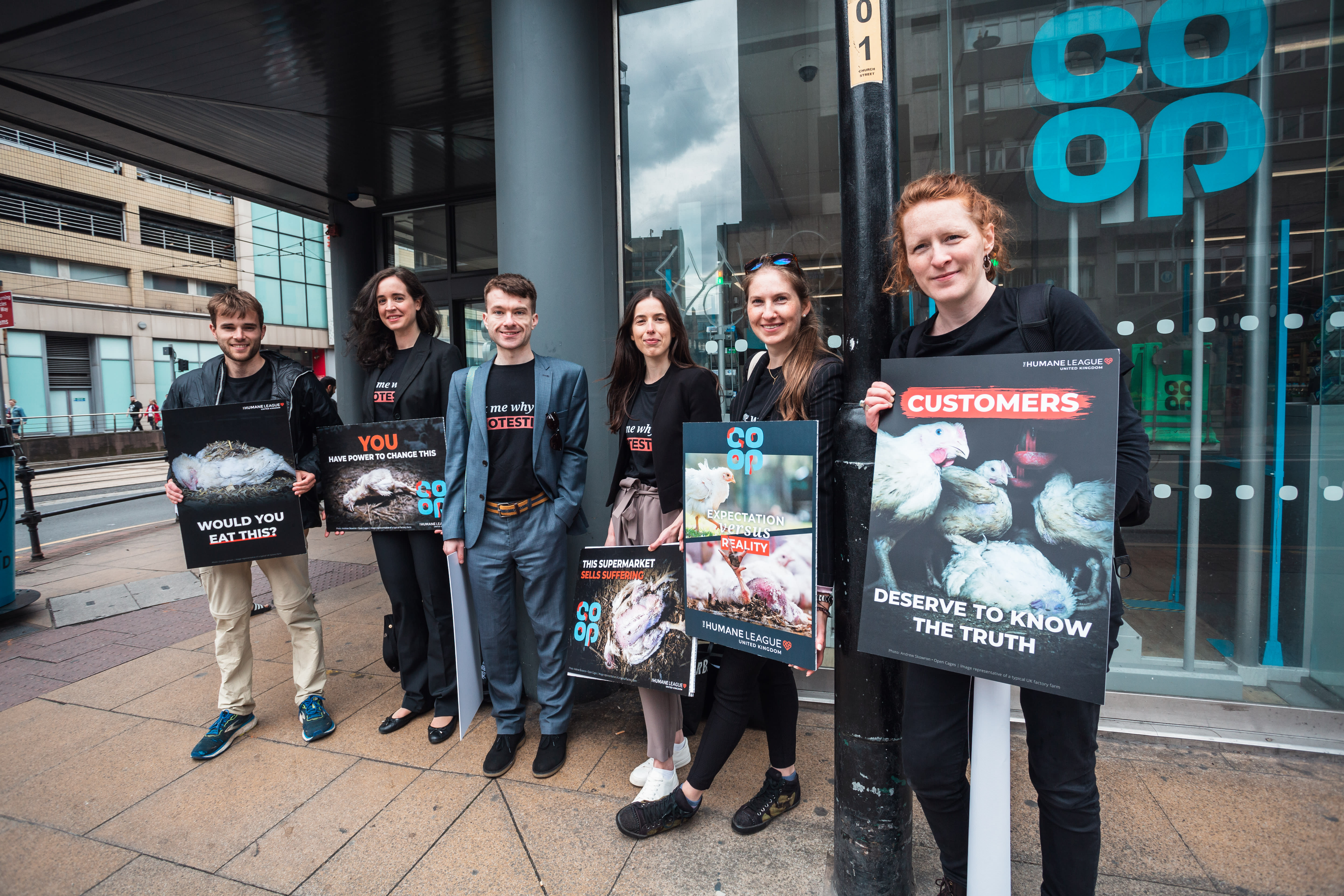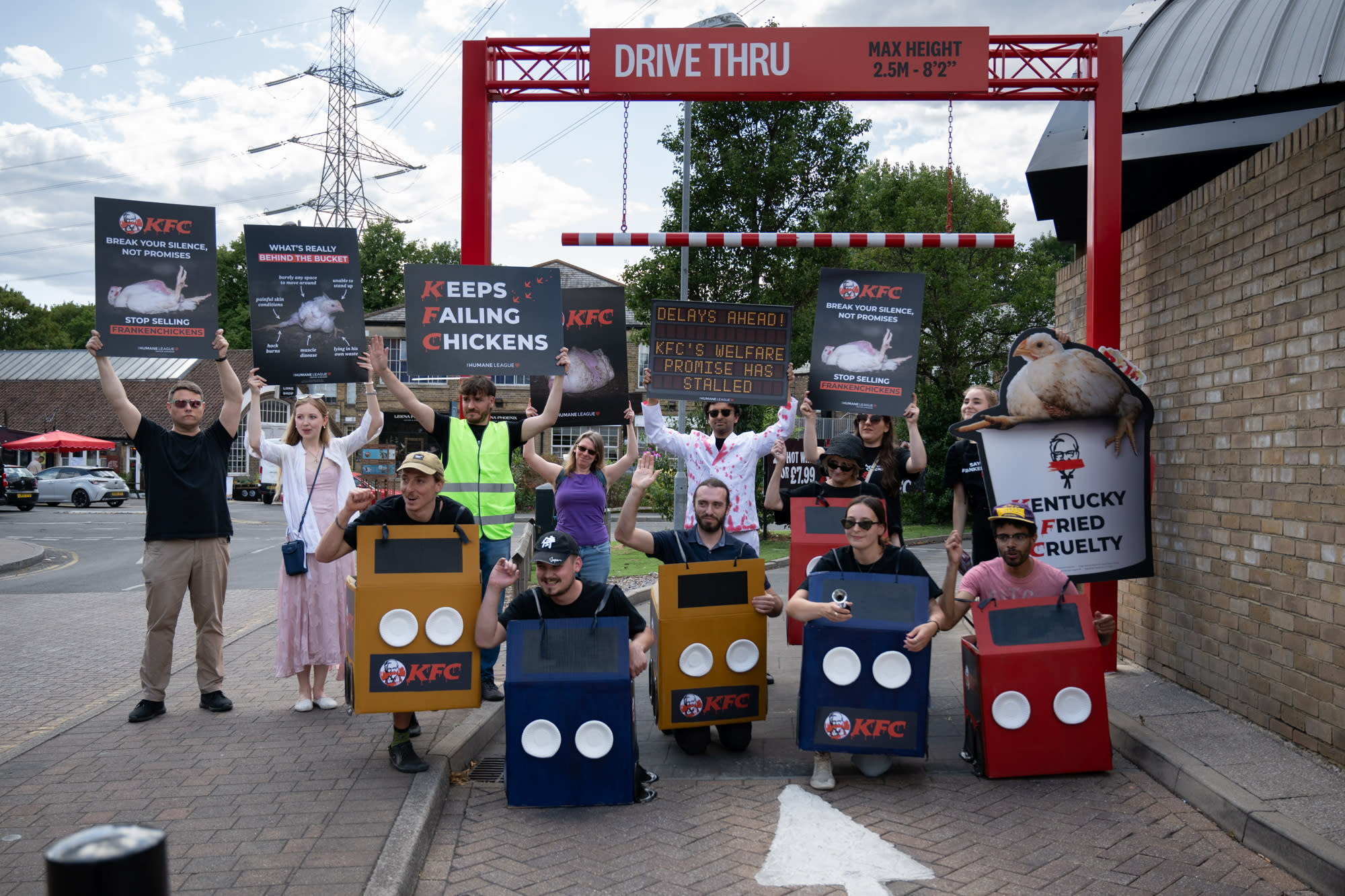




Campaigner and Co-op member, Jodi, responds to Co-op's refusal to stop selling Frankenchickens

Nearly a year on from a landslide vote in support of the Better Chicken Commitment, the supposedly ethical retailer Co-op continues to defend its cruel farming practices.
As the 2024 Co-op AGM approaches, Co-op has released its annual “You Said, We Did” publication. Disappointingly, it’s looking more like “You Said, We Didn’t.”
The vast majority of chickens reared for sale in Co-op are Frankenchickens - artificially bred to grow so big, so fast, that their bodies can’t keep up. As a result of their breeding, these chickens suffer from horrific health conditions, including organ failure, heart attacks, leg deformities, and chemical burns.
Unsurprisingly, Co-op members are demanding change. A staggering 96% of voting members supported a 2023 members-led motion, calling on the Co-op board to improve welfare standards for chickens by adopting the Better Chicken Commitment (BCC), a science-backed welfare policy that would improve the lives of millions of chickens each year.
You’d think that a retailer which prides itself on its values of democracy, equality and equity, and that champions “truly ethical trading” would have adopted the BCC immediately. Instead, Co-op is not only refusing to end the use of fast-growing breeds but is now profiting from an aggressive and misleading advertising campaign claiming that its chickens now have “space to thrive”.
Things were off to a bad start when, in the “You Said, We Did” section of the 2024 AGM booklet, Co-op chose to misrepresent the 2023 motion, suggesting that it only called upon Co-op to “make changes to improve the space chickens bred for meat have to live,” conveniently omitting any mention of fast-growing breeds. By doing so, Co-op gave itself a pat on the back for providing 20% more space for chickens in its supply chain while entirely ignoring the vital breed element of the BCC.
The benefits of providing chickens with more space are limited without also changing the breed. Fast-growing birds are often unable to walk or even stand due to the weight of their own bodies. What use is more space if you can't walk?
The situation worsened when the Co-op recycled tired excuses against improving welfare in an outdated video and through its “You Said, We Did” booklet. As one of the 96% of Co-op members that voted for the Better Chicken Commitment, here is my response to its claims:
“We all know how important animal welfare is to you”
Co-op’s executives know that we care about welfare, yet are refusing to act on the most important issue affecting chicken welfare: the use of fast-growing breeds of chickens.
“We should not forget that we already have a leadership position in this space”
Co-op did once hold a leadership position in the animal welfare space - back in the ‘90s? Since 2012, Co-op has reneged on welfare commitments, prioritising profits over ethics. Its refusal to adopt the BCC is no different.
M&S has already implemented the BCC, Waitrose has adopted it, and Sainsbury’s, Morrisons and Lidl have all committed to reducing stocking density by 20%. It’s unclear what Co-op is leading, apart from misleading its members.
“Ensuring all the animals in our supply chain are looked after is an absolute priority for us and that’s why all of our poultry meets or exceeds RSPCA Assured standards or red tractor”
Sometimes, you’ve got to laugh—the quick, last-minute addition of “or red tractor” to the end of this sentence. While claiming welfare is an “absolute priority”, Co-op neglects to mention that only a small fraction of the chicken sold in its stores are RSPCA Assured.
The vast majority of its chicken products are Red Tractor assured, but the Red Tractor standards are barely above the legal minimum, permitting high stocking densities and fast-growing breeds.
“If we look at the slower growing breed it will mean more birds on the ground.. more sheds.. more farms and that actually will have a significant impact on our carbon footprint”
Not only is Co-op oversimplifying what moving to slower-growing breeds will mean in terms of sustainability, but it also implies that it’s acceptable to make animals suffer in pursuit of its sustainability goals.
Let’s be clear: No company, nobody, should be trying to reduce their carbon footprint by torturing animals.
“We are still in a cost of living crisis”
We cannot dig ourselves out of a cost-of-living crisis by harming animals. Retailers like the Co-op have a duty to provide all customers with access to products that align with their values.
Does Co-op really have the funds to invest in vanity projects like Co-op Live and its ambitious growth plans, but lacks the resources to invest in animal welfare?
Conclusion
As a supposedly ethical retailer, Co-op must take responsibility for addressing the welfare concerns raised by its members. If the company genuinely believes in "truly ethical trading," it must adopt the Better Chicken Commitment.
It's time for Co-op to put its values into action and stop compromising animal welfare for profit. After all, 96% of Co-op members have made it clear that they expect nothing less.
Want to get involved? Join the demonstration at the 2024 AGM in Manchester. We’re protesting not only for the chickens, but for Co-op democracy too!

 Jodi Darwood
Jodi Darwood






